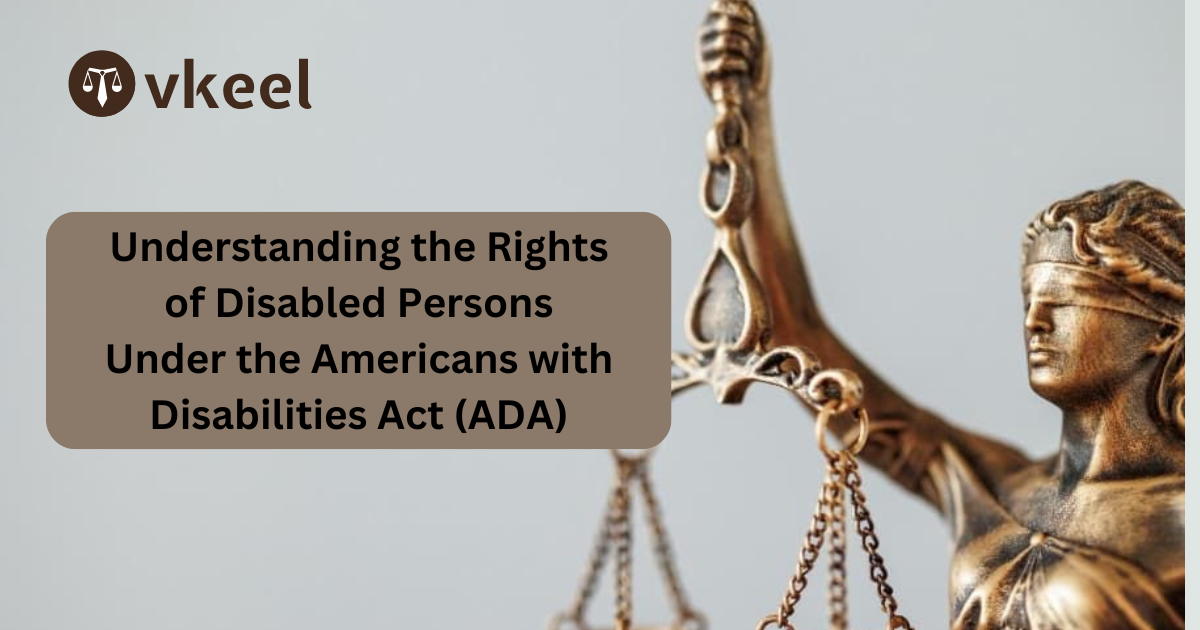Understanding the Rights of Disabled Persons Under the Americans with Disabilities Act (ADA)
By Himanshu Kumar
Table of Contents
Introduction
The Americans with Disabilities Act (ADA) is a landmark piece of legislation in the United States that aims to protect the rights of disabled individuals. While the ADA is a U.S. law, it has inspired similar legislative efforts around the world, including in India.
The rights of disabled persons have been a focal point in discussions surrounding equality and human rights. Globally, the Americans with Disabilities Act (ADA) stands as a significant legal framework ensuring rights for disabled individuals in the United States. In India, similar legislative efforts have been undertaken to protect and promote the rights of persons with disabilities.
Overview of the Americans with Disabilities Act (ADA)o
The ADA, enacted in 1990, is a civil rights law that prohibits discrimination against individuals with disabilities in all areas of public life, including jobs, schools, transportation, and all public and private places open to the general public. The ADA’s purpose is to ensure that people with disabilities have the same rights and opportunities as everyone else.
Key Provisions of the ADA
- Title I: Employment
- Prohibits discrimination against qualified individuals with disabilities in employment practices.
- Employers must provide reasonable accommodations to employees with disabilities unless doing so would cause undue hardship.
- Title II: Public Services
- Prohibits discrimination against disabled individuals in public services, programs, and activities provided by state and local governments.
- Public entities must ensure that their services, programs, and activities are accessible to individuals with disabilities.
- Title III: Public Accommodations
- Prohibits discrimination in public accommodations operated by private entities such as hotels, restaurants, retail stores, and more.
- Requires these places to remove barriers to accessibility wherever it is readily achievable.
- Title IV: Telecommunications
- Requires telecommunications companies to provide services that allow individuals with hearing or speech disabilities to communicate over the telephone.
- Title V: Miscellaneous Provisions
- Contains various provisions, including those relating to insurance, attorney’s fees, and the relationship of the ADA to other laws.
Significant Amendments
The ADA Amendments Act (ADAAA) of 2008 made significant changes to the ADA, particularly in broadening the definition of disability. The ADAAA emphasized that the term “disability” should be interpreted broadly to include more individuals.
Important Case Laws Under the ADA
1. Toyota Motor Manufacturing, Kentucky, Inc. v. Williams (2002)
In this case, the Supreme Court ruled that an impairment must substantially limit a major life activity to be considered a disability under the ADA. The decision initially narrowed the scope of who was protected under the ADA.
2. Sutton v. United Air Lines, Inc. (1999)
The Supreme Court decided that mitigating measures (like medication or assistive devices) should be considered when determining if an individual has a disability. This ruling also limited the scope of ADA protections before the ADAAA broadened the definition of disability.
3. Olmstead v. L.C. (1999)
This landmark case addressed the rights of individuals with mental disabilities to live in the community rather than institutions. The Supreme Court held that unnecessary institutionalization of persons with disabilities constitutes discrimination under the ADA.
4. Board of Trustees of the University of Alabama v. Garrett (2001)
The Supreme Court ruled that state employees could not sue their state employer for monetary damages under the ADA. This case limited the scope of the ADA in terms of remedies available to state employees.
Disability Rights in India: A Comparative Analysis
India has made significant strides in protecting the rights of disabled persons through legislation and policy measures. The primary law governing disability rights in India is the Rights of Persons with Disabilities Act (RPwD Act), 2016, which replaced the Persons with Disabilities (Equal Opportunities, Protection of Rights and Full Participation) Act, 1995.
Key Provisions of the RPwD Act, 2016
- Definition of Disability
- Expands the definition of disability to include 21 conditions such as blindness, low vision, leprosy-cured persons, hearing impairment, locomotor disability, mental illness, autism, and more.
- Recognizes that the definition of disability can evolve with advancements in medical science.
- Rights and Entitlements
- Guarantees equality and non-discrimination in various spheres, including education, employment, and social security.
- Mandates the provision of reasonable accommodation and accessibility to ensure full participation of persons with disabilities in society.
- Education
- Ensures inclusive education for children with disabilities by making necessary accommodations in schools and higher education institutions.
- Prohibits discrimination and ensures that educational institutions provide support services and infrastructure for disabled students.
- Employment
- Requires employers to provide reasonable accommodations and prohibits discrimination in matters of employment.
- Mandates a 4% reservation in government jobs for persons with benchmark disabilities.
- Accessibility
- Ensures accessibility in public buildings, transportation, information and communication technology, and services provided to the public.
- Sets timelines for making existing infrastructure accessible and mandates that new constructions be compliant with accessibility standards.
Significant Case Laws in India
1. Justice Sunanda Bhandare Foundation v. Union of India (2017)
The Supreme Court of India directed all states and Union Territories to implement the RPwD Act, 2016, in letter and spirit. The judgment emphasized the need for accessibility in public buildings and transportation.
2. Deaf Employees Welfare Association v. Union of India (2014)
This case led to the Supreme Court directing the government to reserve a certain percentage of posts for persons with disabilities in public employment, reinforcing the provisions of the RPwD Act regarding employment.
3. National Association for the Deaf v. Union of India (2018)
The Delhi High Court ruled in favor of providing sign language interpreters for deaf individuals in public institutions, highlighting the importance of accessibility and reasonable accommodation.
4. Siddaraju v. State of Karnataka (2020)
The Supreme Court reiterated that persons with disabilities should be given reservation in promotions in government jobs, upholding the principle of equality and non-discrimination.
Conclusion
Both the ADA in the United States and the RPwD Act in India represent significant strides in ensuring the rights and protections of disabled persons. The ADA has set a global standard for disability rights, influencing legislation worldwide, including India’s comprehensive approach under the RPwD Act.
While the ADA has seen significant amendments to broaden its scope, India’s RPwD Act reflects a modern understanding of disability, ensuring that individuals with disabilities have equal access to opportunities and resources. Both legal frameworks emphasize the importance of reasonable accommodation, non-discrimination, and accessibility in creating inclusive societies.
The case laws under both the ADA and the RPwD Act highlight the ongoing legal battles to secure these rights and the evolving nature of disability law. These cases reinforce the importance of continued advocacy and legal reform to protect and promote the rights of disabled persons.
In conclusion, understanding the rights of disabled persons under the ADA and the RPwD Act reveals a shared commitment to ensuring that all individuals, regardless of their abilities, have the opportunity to lead fulfilling and dignified lives. The journey towards full equality and inclusion is ongoing, but these laws provide a robust foundation for progress.
Disclaimer:
The information provided in the article is for general informational purposes only, and is not intended to constitute legal advice or to be relied upon as a substitute for legal advice. Furthermore, any information contained in the article is not guaranteed to be current, complete or accurate. If you require legal advice or representation, you should contact an attorney or law firm directly. We are not responsible for any damages resulting from any reliance on the content of this website.










